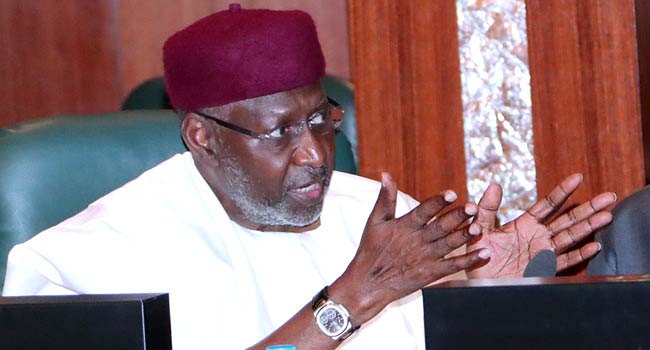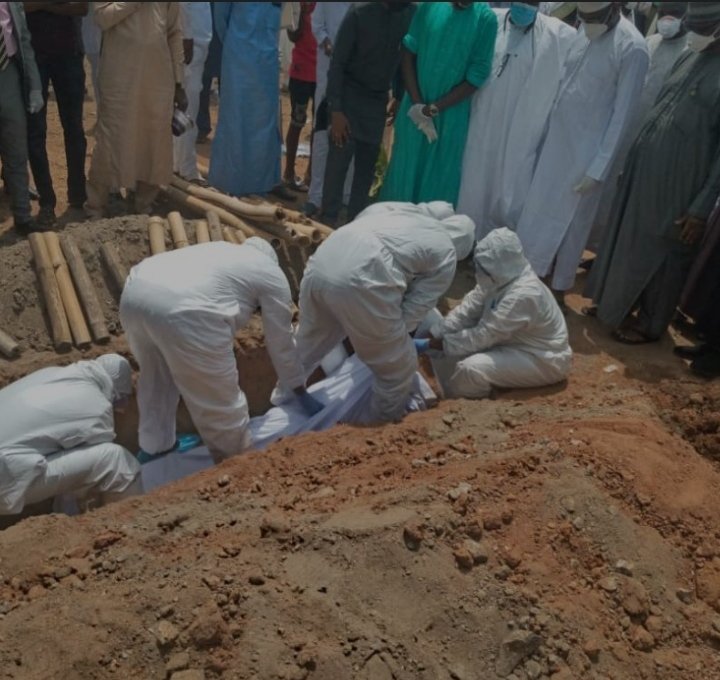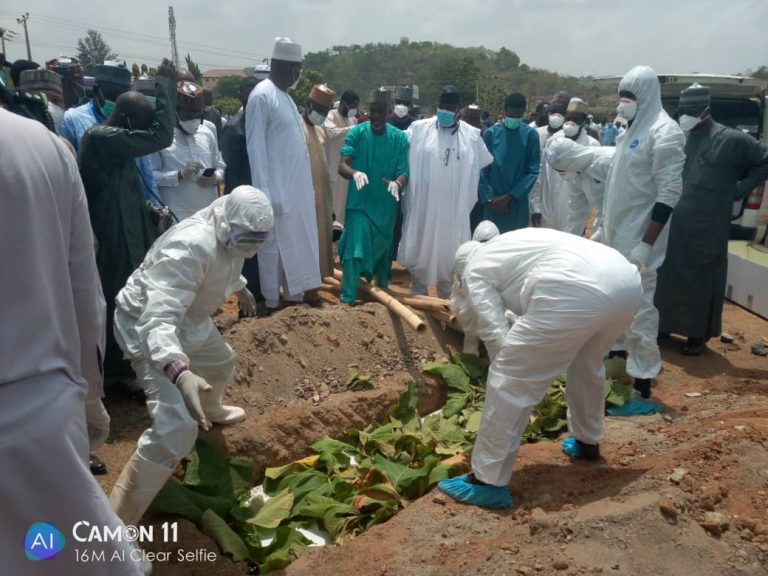Abba Kyari, Power Behind The Throne, Falls To COVID-19

On Saturday, April 18, the news of the demise of Abba Kyari, the Chief of Staff to President Muhammadu broke. He died of COVID-19 of which he was confirmed to be the first high profile individual in Nigeria to test positive.
The news generated varied opinions with some showing sympathy and others showing excitement that the man considered to be in the way of progress in the five years of the Buhari administration was no more.
However, his death has re-awakened the consciousness of the people to the reality of the novel coronavirus in Nigeria.

From the day Kyari tested positive to the virus on March 24, opinion was divided between empathy for him and condemnation, especially given his position and the effects of his actions in government.
He had returned from an official trip in Germany, where it was suspected he contracted the disease.
Kyari was in Germany on March 7 to meet with officials of Siemens AG in pursuit of the deal recently signed between the Nigerian government and the energy company.
He was in Europe with the the Minister of Power, Mr Saleh Mamman, and returned to the country on March 14.
Although he did not show symptoms, Kyari decided to take the COVID-19 test which turned out positive.
Kyari had underlying health problems, including diabetes. He began treatment immediately and was in medical care till his death.
Six days after he tested positive, Kyari released a statement announcing that he would be transferred to Lagos for further treatments and hoped that he would be on his feet soon.
He added that he did not have serious symptoms but in quarantine and obeying medical advice.
“This is a precautionary measure: I feel well, but last week, I tested positive for coronavirus, the pandemic that is sweeping the world.
“I have followed all the protocols the government has announced to self-isolate and quarantine.
“I am writing to let you know that on medical advice, I will transfer to Lagos later today for additional tests and observation,” the chief of staff wrote.
As Chief of Staff, kyari was the subject of several debates and was dubbed ‘the most powerful man in Aso Rock’.
His tenure in office was not short of controversies.
In a letter dated December 9, 2019, the National Security Adviser, Major-Gen. Babagana Monguno, accused Kyari of meddlesomeness in national security matters.
Ordinarily, Kyari should have no role in the area but it appeared he had been playing the surrogate for Buhari by holding meetings with the security chiefs without the involvement of the official who should have been at the centre of discussions, Monguno.
When Nigeria attempted to prepare for COVID-19 in February, the Federal Ministry of Health’s inability to procure equipment and equip laboratories at the time affected Nigeria’s preparation for a possible outbreak.
The Presidency through the Chief of Staff, Kyari, had in October 2018, stripped the ministry of its powers to make procurement and transferred the responsibility to the Federal Ministry of Agriculture and Rural Development.
Reports said the development was the result of power play between the then Minister of Health, Prof. Isaac Adewole, and Kyari.
Eight months after Adewole’s exit, Kyari failed to reverse the directive.
Who was Abba Kyari?
In death, the chief of staff has elicited some emotional comments, some of which extol his loyalty, intellect and dedication to service.
“I have lost a friend of 40 years. We were at Cambridge together. We worked in my father’s law firm together.
“We remained close throughout right up until the end even though we disagreed politically. Abba was a good man, a man of honour and a loyal friend. May his soul rest in peace,” Femi Fani-Kayode, a former Minister of Aviation and member of the opposition People’s Democratic Party, wrote.
The executive secretary of Nigeria Extractive Industry Transparency Initiative, Waziri Adio, said, “When my mum died earlier this year, the second person to come to the house same day to condole me (after @Olusegunverdict) was Mallam Abba Kyari.
“Deeply human. Deeply cerebral. Deeply loyal to his principal and his country, not the caricature widely sold. May God grant him rest,” Adio added.
Writer Fawehinmi on twitter @DoubleEph shared his personal encounter with Kyari.
Fawehinmi, who had been publicly critical of the late chief of staff, wrote, “The death of Abba Kyari greatly saddens me. He was one of the Nigerian government officials I abused the most here until one fine day last December.”

Fawehinmi went on to narrate how Kyari had called him to meet up during which they exchanged two books each and spoke for two hours about everything from “Buhari to the second Niger Bridge.
“Since then, we have chatted very regularly until the last two weeks when his illness took a turn for the worse,” he added.
Catriona Laing, the British High Commissioner, in her condolence message, described Kyari as “an exceptional man who worked tirelessly for his beloved Nigeria”.
More messages have continued pour in since the news of his death was received. In many, criticisms of his leadership style overwhelmed his death.
The criticisms were heightened by the pictures from his funeral, which took place around midday on Saturday, where attendees clearly did not observe social distancing despite the fact that hevdied of COVID-19.
Kyari graduated with a bachelor’s degree in sociology from the University of Warwick in 1980. He also obtained a bachelor’s degree in law from the University of Cambridge in 1983 and was called to the Nigerian Bar after attending the Nigerian Law School.
In 1984, he obtained a master’s degree in law from the University of Cambridge.
He later attended the International Institute for Management Development in Lausanne, Switzerland, in 1992, and participated in the Programme for Management Development at Harvard Business School in 1994.
Kyari worked for the Law firm of Fani-Kayode and Sowemimo for some time after his return to Nigeria.
Between 1988 and 1990, he was Editor with the New Africa Holdings Limited Kaduna, (publishers of Democrat Newspapers).
He worked with the Borno State Executive Council as Commissioner for Forestry and Animal Resources in 1990 and was Secretary to the Board of African International Bank Limited, between 1990 and 1995.
Kyari was Executive Director, Management Services, United Bank for Africa Plc. (UBA) and later the Managing Director and Chief Executive Officer of the bank. He was appointed a Director of Unilever Nigeria Plc in 2002.
He served as Honorary Member of the Presidential Advisory Council on Investment in Nigeria between 2000 and 2005 and was a recipient of the Nigerian Honor Award of Officer of the Order of the Niger (O.O.N).
Power vacuum in Aso Rock?
As soon as news of his death filtered in, some Nigerians began to closely examine Kyari’s role in Buhari’s government and speculated on who would succeed him.
The speculation was fueled by his reputation in office as well as the reactions of those close to the president when Kyari was ill.
There have been reports about the tussle between him and members of Buhari’s family. Much was inferred when Zahra Indimi, Buhari’s daughter, posted a cryptic message on her Instagram story the day Kyari was diagnosed with COVID-19.
She wrote, “Earth is cleansing itself and its inhabitants. Karma is the most patient gangster ever.”
In spite of the inhibitions, many believe that Nigeria has lost its leader who might be difficult to replace.
Social commentator, Dr Farooq Kperogi, said, “With Kyari’s death, Nigeria is now truly leaderless. Abba Kyari ruled the country on Buhari’s behalf.
“In the midpoint of last year, a northern retired general told me Abba Kyari said in private that people who vilify him don’t realise that without him Nigeria would be rudderless and descend into chaos.
“Now that he is gone, the chaos he talked about would start in the coming days and weeks.
“There is a yawning, potentially disorienting power vacuum in the presidential villa,” Kperogi said.
Support Our Journalism
There are millions of ordinary people affected by conflict in Africa whose stories are missing in the mainstream media. HumAngle is determined to tell those challenging and under-reported stories, hoping that the people impacted by these conflicts will find the safety and security they deserve.
To ensure that we continue to provide public service coverage, we have a small favour to ask you. We want you to be part of our journalistic endeavour by contributing a token to us.
Your donation will further promote a robust, free, and independent media.
Donate Here





